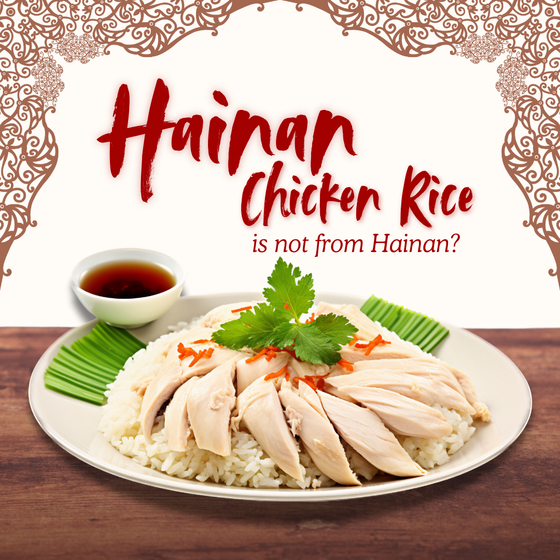Zongzi: A Delicious Lucky Charm
May 07, 2025

Every year during the Dragon Boat Festival (端午节), families across China and beyond come together to prepare and enjoy zongzi — glutinous rice dumplings wrapped in bamboo or reed leaves. But these pyramid-shaped bundles are more than just a festive treat.
A Bite of History
Zongzi commemorates Qu Yuan, a patriotic poet from the Warring States period. After his exile and eventual suicide in the Miluo River, villagers threw rice into the river to keep fish from eating his body — a ritual believed to be the origin of zongzi. The racing boats we see today symbolize the villagers’ desperate search for him.
Wrapped in Meaning
Traditionally believed to ward off evil spirits and promote health, zongzi also represents protection, remembrance, and family unity. Making zongzi is often a hands-on, intergenerational activity that strengthens bonds.
Sweet or Savory
Depending on the region, it has different flavours!
North: Sweet with red bean or jujube
South: Savory with pork belly, mushrooms, and salted egg yolk Outside China, you’ll find unique versions like bakcang (Indonesia) or bánh ú tro (Vietnam) which are highly influenced by the Southern Chinese who moved to South East Asia and settled there!
A Timeless Tradition
Today, zongzi bridges past and present — blending flavor with folklore. Whether you eat it for luck, for love, or just because it’s delicious, each bite carries centuries of tradition.
Leave a comment
Comments will be approved before showing up.
Also in News

Hainanese Chicken Rice is not from Hainan?
August 22, 2025
Did you know, despite the name, the version we eat in Singapore didn’t exactly come from Hainan?

Fried Chicken & Freedom: Honouring Juneteenth Through the Foods That Tell Its Story
June 16, 2025
As we celebrate Juneteenth, let’s remember: dishes like fried chicken carry stories — of oppression, resistance, and ultimately, freedom. Sharing them is a way to honour the past while keeping cultural memory alive.

The Story Behind Cap Go Meh: A Festival of Light and Unity
February 07, 2025
Have you ever wondered about the meaning behind the popular term Cap Go Meh?
Subscribe
Sign up to get the latest on sales, new releases and more …
Recent Articles
-
Hainanese Chicken Rice is not from Hainan?
August 22, 2025
-
Fried Chicken & Freedom: Honouring Juneteenth Through the Foods That Tell Its Story
June 16, 2025
-
Zongzi: A Delicious Lucky Charm
May 07, 2025
-
The Story Behind Cap Go Meh: A Festival of Light and Unity
February 07, 2025
-
Chinese New Year Essentials Munchies and Their Auspicious Meanings
January 27, 2025
-
Pantry Glow-Up for CNY! 🧧🍊🌟
January 09, 2025
-
The Essential Trio of Chinese Cuisine: Ginger, Garlic, and Spring Onions
December 10, 2024
-
Discovering Suppengrün: The Heart of German Soups and Stews
November 21, 2024
-
Thai-Inspired Meal Prep: The Magic of the Trio
November 07, 2024
-
Mastering Mirepoix: The French Flavor Foundation
October 30, 2024
Categories
- 3
- adult-friendly
- alegacy
- Alegacy Aluminium Cheese Slicer
- Alegacy Candy Fry Thermometer
- Alegacy Decorating Bag With Assorted Tubes
- alegacy egg slicer
- alegacy elite slicer knife
- Alegacy Hardwood Rolling Pin
- alegacy lemon squueze
- Alegacy Polyethylene Cutting Board
- Alegacy Stainless Steel Pizza Cutter with Wooden Handle
- alternative
- aluminium foil
- art
- Asparagus Peeler
- bake pizza
- bakeware
- bakeware singapore
- baking
- Baking Mat
- baking paper
- Baking Tools
- Baking with cornflour
- ball bearing
- balls
- banana split bowl
- bar
- bar set
- basting
- bat
- beautiful
- beauyhack
- blades
- blog
- Boning Knife
- brandy butter
- bread
- brownies
- bunny
- cake
- cake mould
- Cake Moulds
- Cake Stands and Turn Tables
- cake tin
- candle fix
- carnation
- carving
- cauliflower
- cheese
- Cheese Knives
- cheesecake
- cheesy witchy fingers
- Chef's Choice 430 Diamond Hone Knife Sharpener
- Chef's Choice Manual Sharpener For Serrated Knife
- Chef's Knives
- children
- chocolate
- chocolate lover
- Chocolate Moulds
- chocolatecraving
- christmas
- classic
- clean and neat slices
- cleaning
- cling wrap
- clingfilm
- clingwrap
- cocktail
- cocktail shaker
- cons
- convenient
- cookie spoon
- cookware
- Coriander Cured Salmon
- Corkscrews
- cream cheese brownies
- Cupcake Silicone Mould
- Cups
- Curved Oval Shape
- cutlery
- Cutting Boards
- cutting cake
- cutting utensil
- dailyhack
- dailylife
- De Buyer Blue Steel Frying Pan
- de Buyer Blue Steel Frypan
- de Buyer Crepe and Pancake Pan Non-Stick
- De Marle
- de marle baking mat
- De Marle Baking Mat - SILPAT
- decor
- decorator
- detox
- differences
- dilemma
- Dining ware
- diy
- drinks
- durable
- easy recipe
- ecard
- Egg Crackers/Cutters
- Egg Poacher
- Eggs
- end of year
- everything nice
- extension
- fall
- fancy
- flower
- food prep
- food service
- foodwrap
- foodwrapz
- fruitcake
- fun
- garnish
- ghost
- glass
- glasses
- gloves
- greaseproof paper
- greetings
- guide to knives
- halloween
- Hamburger Press
- hand cheese grater
- hardwood
- health concern
- healthy eating
- healthy pizza
- height
- home
- homemade
- household
- Ice Bucket
- Ice Cream
- Ice cream bowls
- ice cream scoop
- icing spatula
- innovative
- jigger
- kid-friendly
- king metal stainless steel
- King Metal Stainless Steel Cake Stand 13x3¼"
- King Metal Stainless Steel Colander With Pipe Handle
- King Metal Stainless Steel Measuring Cups
- kitchen
- kitchen hacks
- kitchen items
- Kitchen Shears
- kitchen tools
- kitchenware
- Knife
- Knives
- LACY'S
- ladder
- latex
- Layonnaise
- lemon
- Libbey
- Libbey Wine Glasses
- Libbeys
- lifehack
- light meal plan
- loaf pans
- long lasting
- manicurepro
- Marcato Ampia Noodle Machine
- Mashed Potatoes
- Matfer
- Matfer Beechwood French Rolling Pin
- Matfer Chocolate Mould
- Matfer Exopan Non-Stick Kouglopf Mould
- meat thermometer
- Meat Thermometers
- melon
- metal
- mice
- mince pies
- mixing bowl
- modern
- mother day
- motherday
- mould
- muffin pan
- nailart
- new
- no bake
- non-stick
- nonstick
- offerings
- oreo ball
- oreo recipe
- outdoors
- overindulging on food
- owl
- paderno
- Paderno Bluesteel Pizza Pan
- paderno brandy/cognac warmer
- Paderno Chocolate Mould
- Paderno non-stick loaf pan
- Paderno Oval Hamburger Press
- Paderno Silicone Mould
- Paderno Stainless Steel Casserole Pot
- Paderno Stainless Steel Sauce Pan 2 Handles
- Paderno Stainless Steel Tall Sauce Pan
- Paderno Vacuum Pump Wine Preserver
- pancake pan
- pantry pursuits
- parchment paper
- party
- Pasta Machine
- Pastry Bag
- Pastry Mat
- perfect dinner
- picnic
- pizza recipe
- plastic
- plastic bag wrapper
- plasticwrap
- plate
- Plates
- polycarbonate
- pool
- Potato Masher
- potato ricer
- Pots
- professional
- promotion
- properties
- pros
- pumpkin
- recipe
- recipe sharing
- recipes
- remove blackheads
- ribbed
- roast
- roast beef video
- roasting essentials
- roasting pan
- rolling pin
- rolling pins
- rotating cake stand
- Roul'pat
- Round Stainless Steel Basket/Strainer
- routine
- Royal Steel Stainless Steel Crab/Lobster Fork 8"
- Royal Steel Zinc Alloy Crab/Lobster Cracker
- royal white new bone
- Royal White New Bone Chinese Tea Pot with Lid
- rubbermaid
- rubbermaid icing scaper
- rubbermaid scraper
- rubbermaid stepstool
- safety
- salad in jar
- salt
- sauce pan 2 handles
- saucepan
- savoury
- self baking
- serrated edge
- Set of 4
- Set of 6
- shaker
- Silicon Mould
- silicone
- Silicone Bakeware
- silicone baking mould
- Silicone Moulds
- simple
- singapore
- slicing knife
- slide cutter
- snack
- snacks
- spaghetti holder
- spatula
- spice
- stainless steel
- Stainless Steel Champagne Stopper
- Stainless Steel Frying Pans
- Stainless steel potato ricer/masher
- Stainless Steel Pots
- Stainless Steel Ricer
- stencil
- stencils
- stepladder
- stepstool
- sugar
- sukkuri
- Tanita Digital Scale With Clear Bowl
- thank you
- the right knife
- Thermohauser Letter Decorating Pastry Bag
- thermometer and winemeter
- tips
- top
- vacuum pump wine preserver
- valentine
- vanilla cupcakes
- versatile
- Victorinox
- Victorinox Forged Chef Boning Knife
- Victorinox Forged Chef Boning Knife 15 cm
- vinyl
- watermelon
- Wine Glasses
- wine rack
- wings
- witch
- ZipBag
